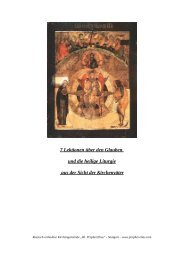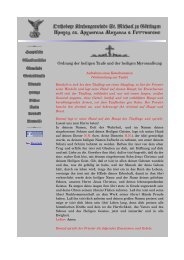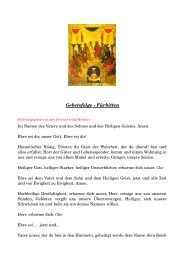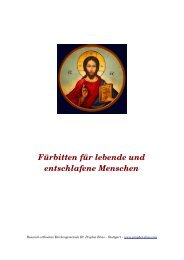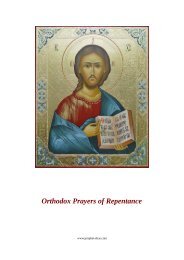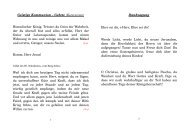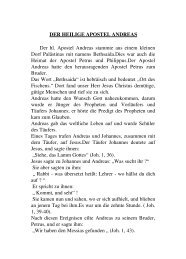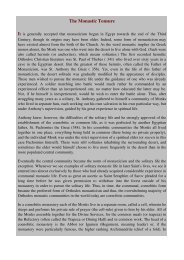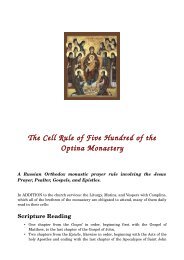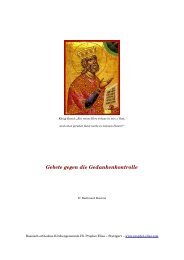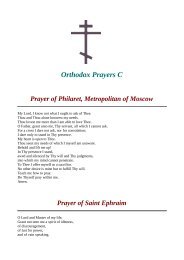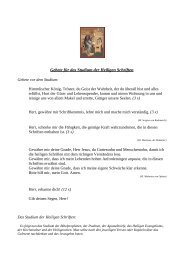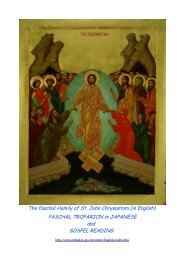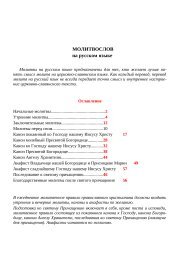THE LAST TRUE REBELLION - Jimdo
THE LAST TRUE REBELLION - Jimdo
THE LAST TRUE REBELLION - Jimdo
Create successful ePaper yourself
Turn your PDF publications into a flip-book with our unique Google optimized e-Paper software.
HOME <strong>REBELLION</strong> TRUTH RESURRECTION LINKS CONTACT<br />
<strong>THE</strong> <strong>LAST</strong> <strong>TRUE</strong> <strong>REBELLION</strong><br />
The Radical, Catacomb teaching of Monk Seraphim Rose by Monk Damascene<br />
Christensen<br />
It's all over for what was once known as Christian civilization. We're living in a<br />
post-Christian age. As the mad prophet Friedrich Nietzsche said, "The 20th century<br />
will be the triumph of NIHILISM." And this triumph, said Monk Seraphim Rose, will<br />
end in a reign of ANARCHY. "Nihilism is the means, Anarchism is the end."<br />
"Nihilism" comes from the word nihil, meaning "nothing." Nietzsche defined<br />
Nihilism thus: "There is no truth. There is no absolute state of affairs--no 'thingin-itself.'<br />
This alone is Nihilism, and of the most extreme kind." Fr. Seraphim wrote<br />
that "Nihilism has become, in our time, so widespread and pervasive, has entered<br />
so thoroughly and so deeply into the minds and hearts of all men living today, that<br />
there is no longer any 'front' on which it may be fought.<br />
This is the mind-set of modern society, and it is the wave of the future. But if<br />
abandonment of Truth has become the mainstream, who then are the rebels? Not<br />
the Nihilists who openly declare that life has no meaning and live as though it did<br />
not. They are only victims who have been devastated by the spirit of the times. The<br />
"Christians,"then? Not if they've sold out to the world, and, while immersed in their<br />
slick, squeaky-clean worldliness, act as if they're trying to stand for something<br />
otherworldly.<br />
No, the true rebels are those who, by their deeds and lives, spit on both the<br />
falsness of the world and on the mainstream of Nihilism that refuses to see above<br />
this world. Such a rebel was Monk Seraphim Rose.<br />
Fr. Seraphim was born into a typical white, middle-class Protestant family in San<br />
Diego in 1934. While growing up, he was the proverbial dutiful child and academic<br />
achiever. After high school, however, he began to passionately seek the answer to<br />
the question "Why?"--and, not finding it in the society in which he had been raised,<br />
he began to rebel. He refused to accept the accepted answers. This was at the very<br />
beginning of the modern counterculture, the early 1950's. Fr. Seraphim became a
student of one of the counterculture's first pioneers, Alan Watts (whom he later<br />
realized was totally pseudo) and became a Buddhist Bohemian in S.F. He learned<br />
ancient Chinese in order to study the Tao Teh Ching and other ancient Eastern texts<br />
in their original language, hoping thereby to tap into their heart of their wisdom. By<br />
this time he had wholly rejected the Protestant Christianity of his formative years,<br />
which he regarded as worldly, weak, and fake; he mocked its concept of God and<br />
said that it "put God in a box." He read Nietzsche until that prophet's words began to<br />
resonate in his soul with an electric, infernal power.<br />
All this time, he had been seeking the Truth with his mind, but the Truth had<br />
eluded him. He fell into a state of despair which he described in later years as a<br />
living hell. He felt he did not fit in the modern world, even in his own family, who did<br />
not understand him. It was as if he had somehow been born out of place, out of<br />
time. He loved to roam under the stars, but he felt that there was nothing out there to<br />
take him in--no God, nothing. The Buddhist "nothingness" left him empty, just as it<br />
did the founder of the Beat movement Jack Kerouac; and, like Kerouac, Fr.<br />
Seraphim turned to drink. He would drink wine voraciously, and then would pound<br />
on the floor, screaming at God to leave him alone. Once while drunk, he raised a fist<br />
to heaven from a mountaintop, cursed God and dared Him to damn him to hell. In<br />
his despair, it seemed worth being damned forever by God's wrath, if only he could<br />
empirically know that God exists--rather than remain in a stagnant state of<br />
indifference. If God did damn him to hell, at least then he would, for that blissful<br />
instant, feel God's touch and know for sure that He was reachable.<br />
"Atheism," Fr. Seraphim wrote in later years, "true 'existential' atheism burning with<br />
hatred of a seemingly unjust or unmerciful God, is a spiritual state; it is a real attempt<br />
to grapple with the true God Whose ways are so inexplicable even to the most<br />
believing of men, and it has more than once been known to end in a blinding vision<br />
of Him Whom the real atheist truly seeks. It is Christ Who works in these souls. The<br />
Antichrist is not to be found primarily in the great deniers, but in the small affirmers,<br />
whose Christ is only on the lips. Nietzsche, in calling himself Antichrist, proved<br />
thereby his intense hunger for Christ...."<br />
In searching through various ancient religious traditions, Fr. Seraphim once went<br />
to visit a Russian Orthodox church. Later he wrote about this experience:<br />
"For years in my studies I was satisfied with being 'above all traditions' but<br />
somehow faithful to them.... When I visited an Orthodox church, it was only in order<br />
to view another 'tradition.' However, when I entered an Orthodox church for the first<br />
time (a Russian church in San Francisco) something happened to me that I had not<br />
experienced in any Buddhist or other Eastern temple; something in my heart said<br />
that this was 'home,' that all my search was over. I didn't really know what this<br />
meant, because the service was quite strange to me, and in a foreign language. I<br />
began to attend Orthodox services more frequently, gradually learning its language<br />
and customs.... With my exposure to Orthodoxy and to Orthodox people, a new idea<br />
began to enter my awareness: that Truth was not just an abstract idea, sought and<br />
known by the mind, but was something personal--even a Person--sought and loved<br />
by the heart. And that is how I met Christ."
On becoming Orthodox, Fr. Seraphim continued to despise the modern world and<br />
hoped for nothing from it; he wanted only to escape it. He felt no less, if not more,<br />
estranged from the Christianity he had been raised in, for while that Christianity was<br />
at home in the world, his was radically otherworldly. He had finally found the<br />
designation of man's existence, and it was this: man is meant for another world.<br />
Fr. Seraphim's was an ascetic faith. He wanted a Christianity that emphasized not<br />
earthly consolation and benefits, but rather heavenly redemption through intense<br />
suffering on earth. No other kind rang true to him who had suffered so much. Only a<br />
God Who allowed His children to be perfected for heaven through suffering, and<br />
Who Himself set the example by coming to a life of suffering--only such a God was<br />
capable of drawing the afflicted world to Himself and was worthy to be worshipped<br />
by the highest spiritual faculties of man.<br />
In his journal, Fr. Seraphim wrote: "Let us not, who would be Christians, expect<br />
anything else from it than to be crucified. For to be Christian is to be crucified, in this<br />
time and in any time since Christ came for the first time. His life is the example--and<br />
warning-- to us all. We must be crucified personally, mystically; for through crucifixion<br />
is the only path to resurrection. If we would rise with Christ, we must first be humbled<br />
with Him--even to the ultimate humiliation, being devoured and spit forth by the<br />
uncomprehending world.<br />
"And we must be crucified outwardly, in the eyes of the world; for Christ's Kingdom<br />
is not of this world, and the world cannot bear it, even a single representative of it,<br />
even for a single moment. The world can only accept Antichrist, now or at any time.<br />
"No wonder, then, that it is hard to be a Christian--it is not hard, it is impossible. No<br />
one can knowingly accept a way of life which, the more truly it is lived, leads the<br />
more surely to one's own destruction. And that is why we constantly rebel, try to<br />
make life easier, try to be half-Christian, try to make the best of both worlds. We must<br />
ultimately choose--our felicity lies in one world or the other, not in both.<br />
"God give us the strength to pursue the path of crucifixion; there is no other way to<br />
be a Christian."<br />
Before he had found the Truth Fr. Seraphim had suffered for the lack of it. Now<br />
having found it he suffered for the sake of it. He devoted the rest of his life to living<br />
that Truth, and killing himself to give it to others. Together with a young Russian man<br />
named Gleb Podmoshensky, he formed a Brotherhood which practiced the "Do It<br />
Yourself" philosophy. They opened a bookstore in S.F. and began printing a small<br />
magazine by hand on a letterpress, refusing to become a dependent arm of the<br />
worldly church establishment. Later, partly to avoid this very establishment, they<br />
moved their printing operation to the wilderness of northern California, where they<br />
began to live like the "desert-dwellers" (wilderness ascetics) of ancient times. There<br />
was no running water on their forested mountain, no telephone, no electric lines.<br />
They built their buildings themselves out of lumber taken from old pioneer dwellings,<br />
and hauled water on their backs up the mountain. They lived with deer, bear, foxes,
abbits, squirrels, bats, mountain lions, scorpions, and rattlesnakes.<br />
In 1970 they became monks, thus dying forever to the world. At this time the<br />
church establishment tried to shut down their wilderness hermitage and make them<br />
standard pastors for parishes in the world. The two monks fought long and hard<br />
against this, and after much suffering achieved victory.<br />
In the wilderness, Fr. Seraphim's spirit began to soar. "The city," he once said, "is<br />
for those who are empty, and it pushes away those who are filled. The desert keeps<br />
those who are filled and allows them to thrive."<br />
Working by candlelight in his tiny cabin, Fr. Seraphim produced a great number of<br />
original writings and translations of ancient ascetic texts. In America his writings have<br />
so far reached only select circles, but in countries formerly behind the Iron Curtain<br />
they have had an incalculable impact on human lives. During the Communist era,<br />
they were secretly translated into Russian and distributed in the underground press<br />
("samizdat") in the form of typewritten manuscripts. By the time of the fall of<br />
Communist Power in 1991, Fr. Seraphim was known all over Russia. Today his<br />
books are on sale everywhere in Russia, including booktables in the Metro (subway)<br />
and on the street. The reason that he has made a much greater mark on Russia<br />
than on his homeland is because in Russia people know how to suffer. Fr.<br />
Seraphim's message of underground Christianity, of suffering and persecution in<br />
this world for the sake of Truth, touches a responsive chord in people who have<br />
already been crucified. In America people would rather hear the "nice" messages of<br />
preachers like Rev. Robert Schuller (who, by the way, broadcasts his show to<br />
Russia, where people can hardly believe how stupid it is).<br />
I met Fr. Seraphim a year and a half before his death in 1982. Like him, I had<br />
been seeking Reality through Eastern religions, etc., by seeking to escape pseudoreality<br />
through a Zen- like breakdown of logical thought processes. Finally reduced<br />
to despair, I listened to Syd Barrett's two schizophrenic-withdrawal, childhoodregression<br />
solo albums over and over, until I had memorized all his word-salads. (In<br />
Russia, this is known as "going crazy on a full stomach.")<br />
Then one day Fr. Seraphim came to the campus where I was going to school. He<br />
drove up in an old beat-up pickup truck, and emerged with his worn-out black robe,<br />
his long hair, and his exceedingly long gray beard which had become matted (I<br />
found out later that he had not taken a bath or shower since becoming a monk ll<br />
years before--which is common monastic practice in Israel, Greece, and Egypt--but<br />
for some reason he didn't smell). It was the image of absolute poverty.<br />
The next thing I remember is walking with Fr. Seraphim through the college.<br />
Dinner had just ended, and the students were milling and hanging around outside<br />
the cafeteria. Everyone was staring at Fr. Seraphim, but he walked through them as<br />
naturally as if he had been at home. In the middle of this progressive American<br />
college, he seemed like someone who had just stepped out of the 4th-century<br />
Egyptian desert.
Fr. Seraphim went to a lecture room and delivered a talk called "Signs of the<br />
Coming of the End of the World." He happened to be sick at this time, and sniffled<br />
throughout the lecture. Obviously exhausted, he yet remained clear-headed,<br />
cheerful, and ready to answer questions at length. I could see that he was at least<br />
as learned and far more wise than any of my professors, and yet he was clearly a<br />
man off the wilderness, more at home in a forest than in a classroom.<br />
What struck me most about Fr. Seraphim was that here was a man who was<br />
sacrificing himself totally for God, for the Truth. He was not a university professor<br />
receiving a comfortable salary for being a disseminator of knowledge, nor was he a<br />
religious leader who hankered after power, influence, or even a bowl of fruit to be<br />
placed at his feet, as did the "spiritual masters" who then had followings in the area.<br />
He was not "into religion" for what he could get out of it; he was not looking for a<br />
crutch, to "enjoy spiritual life." He was just a simple monk who sought the Truth<br />
above all else. And I knew beyond a shadow of a doubt that he would die for that<br />
Truth, for I could sense that he was dying for it already.<br />
As we have said, Fr. Seraphim's message falls on many a deaf ear here in<br />
America. Even people in his same church will only listen to so much of it. When they<br />
think they might have to go against public opinion and risk losing recognition and<br />
acceptance by the world (including the "church world"), they stop short. And yet the<br />
Crucified God to Whom they give lipservice once said to His disciples: "If the world<br />
hate you, ye know that it hated me before it hated you. If ye were of the world, the<br />
world would love his own: but because ye are not of the world, but I have chosen<br />
you out of the world, therefore the world hateth you." "In the world ye shall have<br />
tribulation: but be of good cheer; I have overcome the world."<br />
Those who have suffered immense pain in this world can believe far more deeply<br />
than those who have not, that there must be another world. Those who, like Fr.<br />
Seraphim, have felt themselves out of place in modern society, who have been<br />
"devoured and spit forth by the uncomprehending world," can understand better<br />
Christ's radical call of rejection of the world and rebellion against it. Thus it is not the<br />
"accepted" ones who can hear Fr. Seraphim's message "not of this world" and carry<br />
it out to the end. Just as in the time of Christ, it is the outcasts who get the point.<br />
Even an atheist may be closer to God than a "right-believing" one, if the former is<br />
suffering in his unbelief and the latter is smug and complacent in his belief. As Fr.<br />
Seraphim said, God is working in the souls of the "great deniers" more than in those<br />
of the "small affirmers."<br />
It is not accidental, then, that while many people in Fr. Seraphim's church only go<br />
halfway with his teaching, there is a growing number of people from the punk<br />
movement who are going all the way with it. Several punx have joined the<br />
Brotherhood he founded and are dying to the world as monastics, having found<br />
ancient Orthodox monasticism to be the ultimate punkdom.<br />
As early as 1960, Fr. Seraphim had come to many of the conclusions that the<br />
punx of today have come to. He said that humanity, when divorced from God,<br />
naturally becomes SUBHUMANITY, and that Humanism becomes Subhumanism.
Those artists and musicians who depict modern, godless, autonomous man as<br />
empty, despairing, enraged and dehumanized, hit closer to the truth than the naive,<br />
happy humanist who tries to look at the modern situation with optimism.<br />
A few years later, in 1962, Fr. Seraphim wrote an essay in which he traced the<br />
course that Nihilism takes, directed by the Evil One. His words proved prophetic in<br />
subsequent decades.<br />
At the first stage of Nihilism, he said, is "Liberalism," by which he meant the<br />
attempt to work out a compromise between the Old Order ("Christian civilization")<br />
and the New Order of humanity without God. At the second stage is Realism, in<br />
which belief in the other world and transcendent Truth is abandoned and the whole<br />
concentration is on the material world, physical well-being, technical progress, etc.<br />
Realism, however, denies man's unplanned, irrational needs, and therefore must<br />
evoke a reaction against it, which is the third stage: Vitalism. In the Vitalist stage, the<br />
criterion of Truth is substituted by a new standard: the "life-giving," the "vital." This<br />
may take the form of pseudo-spiritual experiences, the invoking of "powers" and<br />
"presences," or else of the "cult of nature" with its primary elements of the earth, the<br />
body, and sex. Vitalism, Fr. Seraphim said, is "an unmistakable symptom of worldweariness.<br />
It is the product, not of the 'freshness" and 'life'and 'immediacy' its<br />
followers so desperately seek (precisely because they lack them), but of the<br />
corruption and unbelief that are but the last phase of the dying civilization they hate."<br />
Thus, Fr. Seraphim believed, beyond Vitalism there can be only one more,<br />
definitive stage through which Nihilism may pass: the Nihilism of Destruction. "Here<br />
at last," he wrote, "we find an almost 'pure' Nihilism, a rage against creation and<br />
against civilization that will not be appeased until it has reduced them to absolute<br />
destruction."<br />
Since Fr. Seraphim wrote about this in 1962, the youth movements have tended<br />
to correspond with the stages he outlined. The hippie movement of the 60's and<br />
early 70's was an example of Vitalism reacting against the dead Liberalism and dry<br />
Realism of the 50's (when sclence was expected to take care of everything,<br />
conformity was the rule, and spiritual seeking looked down upon). By the 80's and<br />
90's, the ideals of the hippies had proved naive and simplistic, and their Vitalism<br />
gave way to manifestations of the Nihilism of Destruction in a now far more<br />
fragmented youth culture. This is where we are at today. And beyond it, Fr.<br />
Seraphim said, is Anarchy.<br />
"The Nihilism of our times exists in all," Fr. Seraphim wrote, "and those who do not,<br />
with the aid of God, choose to combat it in the name of the fullness of Being of the<br />
living God, are swallowed up in it already. We have been brought to the edge of the<br />
abyss of nothingness and, whether we recognize its nature or not, we will, through<br />
affinity for the ever-present nothingness within us, be engulfed in it beyond all hope<br />
of redemption--unless we cling in full and certain faith (which, doubting, does not<br />
doubt) in Christ, without Whom we are truly nothing....<br />
"Facile interpretations of the 'crisis,' of the 'choice' before us, abound; to take
either side of these illusionary interpretations is damnation. The true crisis is now, as<br />
it has ever been, within us; it is our acceptance or negation of Christ. Christ is our<br />
crisis; He; demands from us all or nothing, and this 'problem' He presents us is the<br />
only one that need be answered.... Do we choose God, Who alone IS, or ourselves,<br />
nothingness, the abyss, Hell? Our age is founded upon nothingness; but this<br />
nothingness, inexplicably to us, presents, for those who can still perceive, the crisis<br />
of all men in all ages most clearly and unmistakably. Our age tells, if we can listen, to<br />
choose the living God."<br />
Back to top



